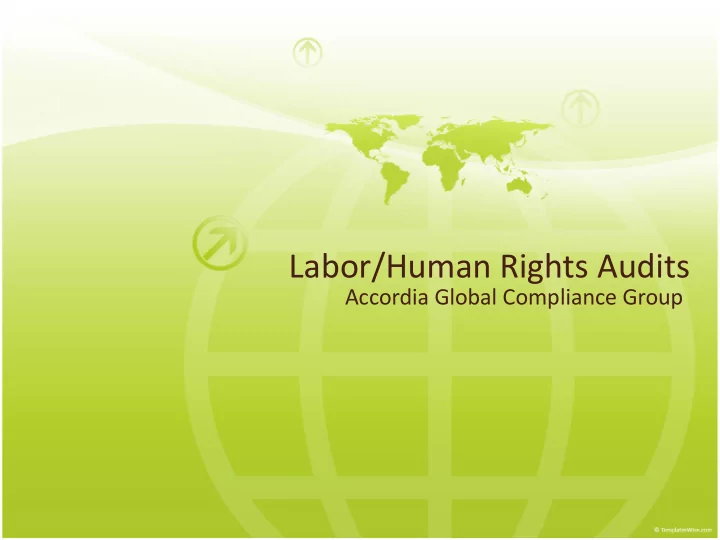

Labor/Human Rights Audits Accordia Global Compliance Group
Accordia Established 2002 Agriculture – Apparel – Food Processing Operates in 22 Major Sourcing Countries Americas – Asia Subcontinent – Southeast Asia Annual Global Audit Volume 2014 - 4,000+
Social Auditing All Major Retailers and Brands Want to be seen as ‘Socially Responsible’ • Commitment to labor and human rights laws, regulations and practices from the top level of their organizations • Driven by Shareholder Pressure, Customers, NGOs, Labor Organizations, Media Attention • “Push” Compliance Through their Supply Chain • Integrating Ethics into Core Business Practices of their Own Companies as well as their Suppliers
Social Auditing Compliance is a Result of Industrial Revolution – Initially Protection of Workers Health and Safety – Then Protection of Workers Wages, Overtime – Then Child Labor, Civil Rights, Unionization, etc. 1990’s – Gain Influence among Media and Government – Rallying point for Students, Labor Unions, Fledgling NGOs looking for a cause
Social Auditing 1990’s (Awareness) Media Driven, Labor Unions Stoked the Flames 2000 – 2005 (Development of Codes/Standards) Retailers Searched for Best Practices and Auditable Codes and Standards to Prove Compliance 2005 – Present (Auditing & Sustainable Practices) Walmart, SMETA, Costco & others
Social Auditing Today - Four Drivers for Retailers 1. Integrating ethics into core business practices – Supplier selection, terms of agreements, ‘buy - in’ 2. Identify Problems in the Supply Chain – Risk assessing and sharing, monitoring and evaluation, worker complaint mechanisms
Social Auditing 3. Improvement Actions Enabling Remediation – Timebound actions, tackling root causes 4. Transparency – Fair and accurate reporting and response to violations
When it Becomes Burdonsome Audit Impacts: – Preparation Consumes Resources (time & money) – Interruption to Business and Production Processes – Creates Worry among Managers and Workers – Costly Repetitive Auditing Impacts are Exponential – Add: Audit Fatigue – Add: Diminishing Benefits
Case for a Multiple Audit Event Auditing will Remain a Supply Chain Tool for Retailers and Brands for the Future Most Codes and Standards Converge Covering 90% Child Labor, Forced Labor, Wages, H&S, Environment Social Audit Protocols by Firms are Almost Identical Walmart, SMETA, Costco, Walgreens, Starbucks, etc.
Case for a Multiple Audit Event SMETA Audit is Becoming Most Widely Accepted in Agriculture and Food Processing Industries Problem Brands may Not Accept SMETA as a Substitute for their own Assessments Recommendation: Wherever Practical, Conduct Combination Audits of SMETA and Brand/Retail Code Audits
Case for a Multiple Audit Event Benefits : 1. Cost Reduction – Pay for one audit, multiple reports are written 2. Reduced Visits – Frequency of audits may be reduced from 5 or 6 per year to 1, 2 or 3 per year 3. Preparation/Resource – Reduce Audit Preparation Time, Conserves Resources
Changes to Walmart Program Walmart will be moving to a ‘risk based’ approach Use data from the World Bank Governance Indicators report of 215 countries to create 3 risk level categories Auditing requirements for each facility in thesupply chain will be based on the category of the country in which the facility is located Category 1 – Lower Risk Category 2 – Medium Risk Category 3 – Higher Risk Walmart reserves the right to audit any facility in their supply chain regardless of category risk rating
Changes to Walmart Program While the approach to auditing is changing, many aspects of the overall program and requirements remain the same. • All Suppliers (excluding Approved Brands) are still required to disclose their facilities producing product for Walmart. • All Suppliers (including Approved Brands) and all of their facilities producing goods for Walmart are expected to adhere to Walmart’s Statement of Ethics and Standards for Suppliers.
Changes to Walmart Program Accordia’s interpretation Audits in North America will be reduced in: – Number of audits – Frequency of reaudits Historically high risk industries (agriculture – child labor) will likely continue to have audits performed
Final Comments and Q&A Thank You Please accept our appreciation for the invitation to present Accordia is a company focused on the importance of Sustainable Ethical and Responsible Sourcing of our clients
Recommend
More recommend